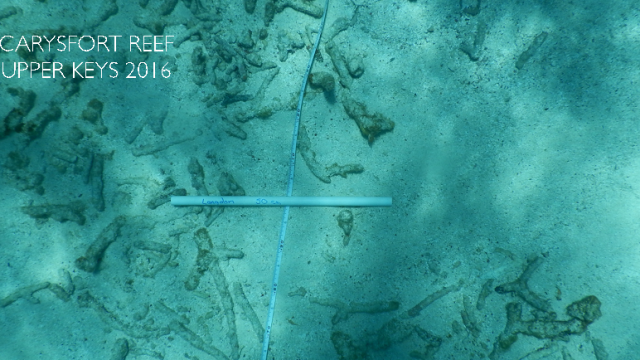As if the oceans needed more terrible news, scientists have learned that the coral reefs surrounding the Florida Keys are dissolving. The culprit — ocean acidification — wasn’t expected to start hitting reefs hard for another three decades.
“We don’t have as much time as we previously thought,” oceanographer Chris Langdon of the University of Miami said in a statement. “The reefs are beginning to dissolve away.”
When carbon dioxide dissolves in seawater, it produces acid, causing the pH to drop. Since the beginning of the industrial revolution, the pH of ocean surfaces worldwide has fallen by about 0.1 units, representing a 30 per cent increase in acidity. The oceans will continue to become more acidic as long as humans keep pumping carbon into the air.

Carbonic acid is formed as a result of dissolving CO2 in water. Image: NOAA
Acidification is bad news for reefs, shellfish and pretty much all “calcifiers”, organisms that secrete a calcium carbonate skeleton. Most of these critters live in waters that are “supersaturated” with respect to calcium carbonate, making it easy for them to pull out the building blocks for their shells from those waters. But acidification leads to “undersaturation”, where ocean chemistry no longer favours the formation of limestone minerals. All things made of calcium carbonate start dissolving.
For years, biologists have accumulated evidence of marine calcifiers losing their shells during bouts of undersaturation. But a new study is the first to show that acidification is already leading to widespread reef dissolution, indicating a more permanent and devastating problem.
Writing this week in Global Biogeochemical Cycles, Langon and his co-authors describe the results of a two-year field campaign that surveyed a 200km stretch of the Florida Reef Tract north of Biscayne National Park to the Looe Key National Marine Sanctuary. Their conclusion? The reefs, which support a $US7.6 billion ($10.1 billion) fishing industry, are wasting away.
“From laboratory studies, we thought that the reefs wouldn’t start to dissolve until the CO2 in our atmosphere rose to 550 or 600 parts per million,” Langdon told Gizmodo. (Our atmospheric CO2 load is presently hovering around 400 ppm.) “It was a real surprise to see that it could be happening sooner.”
The reason, Langdon says, has to do with the fact that the water directly surrounding corals in the Florida Keys is more acidic than the overlying seawater. Corals are often encircled by beds of seagrass, which die off and decompose every winter, releasing additional CO2.
Acidification is not an easy challenge to solve — once the pH of the ocean changes, it takes a long time to revert. And while Langdon’s study is the first to show a reef system on a permanent downward spiral, the problem could already be widespread.
“I wouldn’t be surprised to find that a lot of reefs are closer to net dissolution than we thought,” Mark Eakin, a coral reef expert with the National Oceanic and Atmospheric Administration told Gizmodo. Eakin notes that Florida’s reefs, like many around the world, have also been hit with two of the worst years of back-to-back bleaching, another result of humans messing with the atmosphere.
Langdon is currently involved with an effort to identify genetic variants of coral that are more resistant to acidification, with the hope that we can breed strains that will fare better in the harsher world we’re creating. But he admits that this will at most buy corals a little time.
Over the long run, the very foundation on which the Florida Keys reefs is built — the compressed skeletons of old reefs accumulated over tens of thousands of years — is also getting eaten away. If this foundation disappears, new corals will not be able to permanently settle down.
“Restoration and breeding efforts are only first aid because the actual framework of the reefs is dissolving away,” he said. “It’s buying time, but we need to solve the problem of rising CO2 in the atmosphere.”
Top: The staghorn corals that once surrounded Key Largo are almost entirely gone. Image: Chris Langdon
